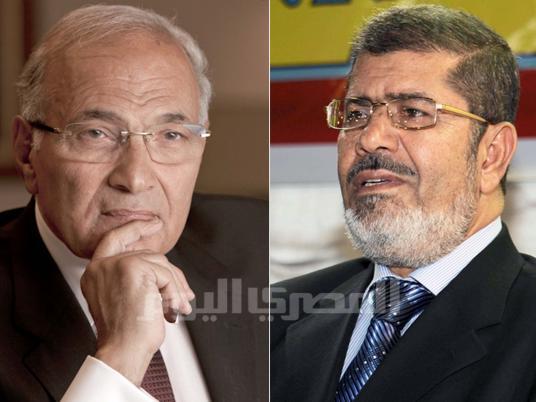
Foreign press coverage of the first round of Egypt's presidential election has been relatively sparse so far, with many reports attributing the outcome to security fears.
United States news outlets seemed short on stories, in comparison to the explosion of media attention that surrounded the uprising in January 2011 that precipitated the elections.
American and European TV audiences, it seems, have tired of the rollercoaster Egypt has been living since 25 January 2011, and can no longer be bothered to keep up with a transition which they have difficulty relating to, amid their own domestic bustle of elections and financial crises.
In the few US newscasts that addressed the first round of Egypt's presidential election, reporters said the poll was decidedly "historic," but largely uneventful. Few outlets ventured into the murky territory of candidates and their support bases.
"For some it was a new day to savor freedoms, for others, there was skepticism about what comes next," said Gwen Ifil, a Public Broadcasting Station anchorwoman. "Millions of voters waited hours in line for the chance to cast a history-making ballot."
Some capitalized on Americans' fascination with Egypt's Pharaonic history in their narrative, a time-tested technique outlets know will draw attention.
"In new Egypt, process is relatively calm and quiet, the lines are orderly, the voters largely patient and good-humored, still learning something new after 5,000 years," Ben Wederman, the American channel CNN's Egypt correspondent.
Drawing another allusion to the past, Wederman featured a 70-year-old Garden City resident who waited in line in order to be the first inside her polling station.
"Now, at least, we have confidence," she said. "We think it's going to be a proper, good election."
Wederman narrated, "For the grand dames of Garden City, elections are, at last, worth the effort."
In print media, the stories aimed for greater nuance.
In its lead-up story to the elections, the New York Times ran a story about how security fears were likely to be the biggest motivator for most voters.
"Parts of the ring road encircling this capital are dangerous no man’s lands, unsafe to drive on, by day or night," New York Times Egypt Correspondent David Kirkpatrick wrote. "Kidnappings and bank robberies are common around the city. And women report sexual assaults by taxi drivers, even in broad daylight."
After his horror-film lead, Kirkpatrick goes on to report that the security breakdown and absence of security forces throughout the country is likely to draw many voters into the fold of familiar names from the old regime. In this estimation, he seems to have been right. Former Prime Minister Ahmed Shafiq, who ran on a platform of security at all costs, had a larger than expected turnout.
A 13 May Washington Post story paid homage to Coptic frustrations with the rise of Islam in the country's politics, particularly Salafi movements.
“People need to know that an Islamist president will lead to civil war. This is our country, too,” the story quoted a tuk tuk driver, Waleed Fawaz, as saying.
Once preliminary results began emerging, many outlets quickly caught on that Egypt’s revolutionary voters would be stuck between "a rock and a hard place," in choosing between the two finalists, Shafiq and Muslim Brotherhood leader Mohamed Morsy.
"Even so, many Egyptians threw up their hands at the results. Some argued that the outcome was inevitable: that an electorate battered by a chaotic transition and under temporary military rule would easily reach for candidates who appealed to fear rather than hope," wrote correspondents Liam Stack and Kareem Fahim for the New York Times.
In a Guardian story headlined with "nightmare scenario," Middle East editor Ian Black said that more unrest is likely on Egypt's horizon.
"In an already tense atmosphere, there could well be serious unrest if, as some predict, Mubarak is acquitted on charges of corruption and illegal killings next month," he wrote.
He went on to quote figures who said that the Brotherhood's lackluster performance in Parliament, coupled with increasing security fears, will likely mean a win for Shafiq.
He quoted an unnamed liberal former MP as saying, "Polarization is the main characteristic of Egyptian society."
The same MP reportedly said that Shafiq beat Moussa because he capitalized on people's worst security fears. "The first concern is law and order," he said.
In France, where a majority of citizens voted to exchange the nationalist Nicolas Sarkozy with the socialist man-of-the-people Francois Hollande just weeks ago, a headline from the popular newspaper La Monde read: "Egypt: Candidate Shafiq promises not to bring back the Mubarak era."
The story describes the Brotherhood offensive that has been mounted against the former regime official, on behalf of the revolution "in danger." It said Brotherhood officials will campaign until the run-off under the idea that, "We need a democratic country. Shafiq is against democracy."
In a Guardian editorial, George Washington University political science professor Nathan Brown was one of the few Western pundits to raise the issue of what a Morsy win, and Brotherhood takeover, could mean for Egypt and globally.
In his editorial, Brown wrote that a Morsy win, and the group's performance once in power, could set a precedent for Islamic parties around the world.
The way and degree to which the Muslim Brotherhood will be able to implement Islamic law, according to Brown, will ultimately hinge on their ability to relieve the average Egyptian's economic burden and weather the diplomatic and political storms.
"In short, while the Brotherhood draws its inspiration from religious texts, it behaves a bit like a French existentialist: existence precedes essence. And that means that the movement will be deeply shaped by current events. Will it wind up marrying itself to political power, as Hamas has done in Gaza? Will it instead build an electoral juggernaut that will maintain the form but not the substance of democracy (like governing parties in Mexico and Japan used to do)? Will its cadres become disgusted or frustrated with politics and turn from running election campaigns back to preaching, educational and charitable work? Or will it become a large, socially conservative political party like the German Christian Democrats, passing in and out of power according to the will of the voters?" he asked.
All of these questions are open-ended, he said.
In a Guardian blog post, US reporter Tom McCarthy comments on the silence from many in the American media on the subject of the elections.
He says many outlets have yet to come to the "stunning realization that the Muslim Brotherhood, which triumphed handily in the country's recent parliamentary elections, may be about to pick up the reins of power where Hosni Mubarak dropped them."
Though admittedly, the US is in the midst of its own election fever, and many news companies will likely step up coverage for the runoffs.
"So when will the United States start to see the first hyperventilating headlines that Al-Qaeda just took over the Middle East?" he wrote.
He ventured a few predictions about what the American media will say about a Morsy win, once they're running on all cylinders, namely, fear mongering.
"The worst examples will equate the Brotherhood and Al-Qaeda and leave out the central, constructive role the Brotherhood has played for millions of Egyptians and Arabs elsewhere. What bad there is to say about the Brotherhood — its attack on secularism, its historic tolerance of violent ideologies, its subjugation of women — will be amplified until all else is drowned out," he wrote. "The subtext will be that the revolution in Egypt was a terrible mistake… The American public will not come away better informed, but they will come away more scared."
Perhaps had McCarthy noticed an MSNBC online piece by correspondent Richard Engel, he might have found the spin which he was expecting.
In an analysis piece published on 25 May, Engel begins with a comparison of current Egypt to 1979 Iran, based on an Iranian friend's saying that older Iranians watching Egypt's elections say, "It looks like what we went through."
He goes on to describe each of the front runners in the election, giving extra space to
Morsy, whose victory would mean "changes [that] could be as profound for this country and the region as they were for Iran."
Engel then went on to pay a disproportional amount of attention to a tenuously related subject, that of Female Genital Mutation (or FGM) which he said the Brotherhood will sanction and proliferate.
"If Morsy becomes president, it will be disastrous for Egyptian women. Some will pay in blood," he wrote.
The tangential notion of his writing barely warrants mention, but the following passage delivers the gist:
"In popular Egyptian and regional culture, women are seen as weak, easy victims to temptation in the same way Eve couldn’t resist that shiny apple in the Garden of Eden. FGM follows the same principle. The clitoris, as a center of sexual pleasure, is seen here as a source of temptation," he expounded.
He ends his scattered and fact-scarce analysis with a prediction: if Morsy wins, Engel said, a military coup will follow.
"A coup would go against every democratic principle that Egyptians fought to achieve in last year’s revolution, but, then again, so would electing Shafiq," he wrote. "A coup would be condemned internationally, but many foreign governments might secretly welcome it."
The reader is left wondering if indeed Engel himself might also welcome the demise of the revolution he praised in his reporting from Tahrir Square in February 2011.




